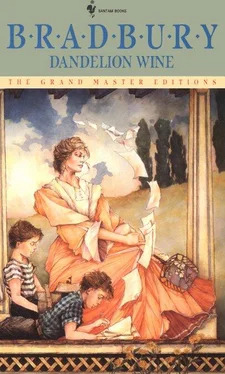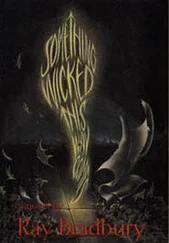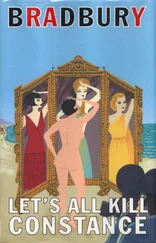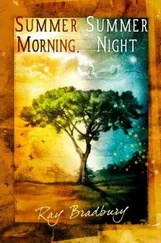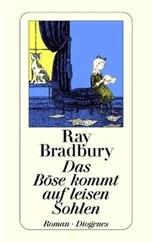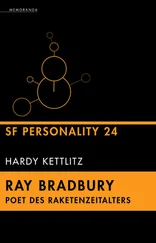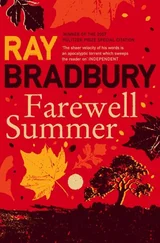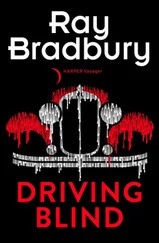The cicadas sang louder and yet louder.
The sun did not rise, it overflowed.
In his room, his face a bubbled mass of perspiration, Douglas melted on his bed.
“Wow,” said Tom, entering. “Come on, Doug. We’ll drown in the river all day.”
Douglas breathed out. Douglas breathed in. Sweat trickled down his neck.
“Doug, you awake?”
The slightest nod of the head.
“You don’t feel good, huh? Boy, this house’ll burn down today.” He put his hand on Douglas’s brow. It was like touching a blazing stove lid. He pulled his fingers away, startled. He turned and went downstairs.
“Mom,” he said, “Doug’s really sick.”
His mother, taking eggs out of the icebox, stopped, let a quick look of concern cross her face, put the eggs back, and followed Tom upstairs.
Douglas had not moved so much as a finger.
The cicadas were screaming now.
At noon, running as if the sun were after him to smash him to the ground, the doctor pulled up on the front porch, gasping, his eyes weary already, and gave his bag to Tom.
At one o’clock the doctor came out of the house, shaking his head. Tom and his mother stood behind the screen door, as the doctor talked in a low voice, saying over and over again he didn’t know, he didn’t know. He put his Panama hat on his head, gazed at the sunlight blistering and shriveling the trees overhead, hesitated like a man plunging into the outer rim of hell, and ran again for his car. The exhaust of the car left a great pall of blue smoke in the pulsing air for five minutes after he was gone.
Tom took the ice pick in the kitchen and chipped a pound of ice into prisms which he carried upstairs. Mother was sitting on the bed and the only sound in the room was Douglas breathing in steam and breathing out fire. They put the ice in handkerchiefs on his face and along his body. They drew the shades and made the room like a cave. They sat there until two o’clock, bringing up more ice. Then they touched Douglas’s brow again and it was like a lamp that had burned all night. After touching him you looked at your fingers to make sure they weren’t seared to the bone.
Mother opened her mouth to say something, but the cicadas were so loud now they shook dust down from the ceiling.
Inside redness, inside blindness, Douglas lay listening to the dim piston of his heart and the muddy ebb and flow of the blood in his arms and legs.
His lips were heavy and would not move. His thoughts were heavy and barely ticked like seed pellets falling in an hourglass slow one by falling one. Tick.
Around a bright steel comer of rail a trolley swung, throwing a crumbling wave of sizzling sparks, its clamorous bell knocking ten thousand times until it blended with the cicadas. Mr. Tridden waved. The trolley stormed around a comer like a cannonade and dissolved. Mr. Tridden!
Tick. A pellet fell. Tick.
“Chug-a-chug-ding! Woo-woooo!”
On the roof top a boy locomoted, pulling an invisible whistle string, then froze into a statue. “John! John Huff, you! Hate you, John! John, we’re pals! Don’t hate you, no.
John fell down the elm-tree corridor like someone falling down an endless summer well, dwindling away.
Tick. John Huff. Tick. Sand pellet dropping. Tick. John . . .
Douglas moved his head flat over, crashing on the white white terribly white pillow.
The ladies in the Green Machine sailed by in a sound of black seal barking, lifting hands as white as doves. They sank into the lawn’s deep waters, their gloves still waving to him as the grass closed over . . .
Miss Fern! Miss Roberta!
Tick . . . tick . . .
And quickly then from a window across the way Colonel Freeleigh leaned out with the face of a clock, and buffalo dust sprang up in the street. Colonel Freeleigh spanged and rattled, his jaw fell open, a mainspring shot out and dangled on the air instead of his tongue. He collapsed like a puppet on the sill, one arm still waving . . .
Mr. Auffmann rode by in something that was bright and something like the trolley and the green electric runabout; and it trailed glorious clouds and it put out your eyes like the sun. “Mr. Auffmann, did you invent it?” he cried. “Did you finally build the Happiness Machine?”
But then he saw there was no bottom to the machine. Mr. Auffmann ran along on the ground, carrying the whole incredible frame from his shoulders.
“Happiness, Doug, here goes happiness!” And he went the way of the trolley, John Huff, and the dove-fingered ladies.
Above on the roof a tapping sound. Tap-rap-bang. Pause. Tap-rap-bang. Nail and hammer. Hammer and nail. A bird choir. And an old woman singing in a frail but hearty voice.
“Yes, we’ll gather at the river . . .river . . . river . . . Yes, we’ll gather at the river . . .That flows by the throne of God . . .”
“Grandma! Great-grandma!”
Tap, softly, tap. Tap, softly,
“. . . river . . . river . . .”
And now it was only the birds picking up their tiny feet and putting them down again on the roof. Rattle-rattle. Scratch. Peep. Peep. Soft. Soft.
“. . . river . . .”
Douglas took one breath and let it all out at once, wailing.
He did not hear his mother run into the room.
A fly, like the burning ash of a cigarette, fell upon his senseless hand, sizzled, and flew away.
Four o’clock in the afternoon. Flies dead on the pavement. Dogs wet mops in their kennels. Shadows herded under trees. Downtown stores shut up and locked. The lake shore empty. The lake full of thousands of people up to their necks in the warm but soothing water.
Four-fifteen. Along the brick streets of town the junk wagon moved, and Mr. Jonas singing on it.
Tom, driven out of the house by the scorched look on Douglas’s face, walked slowly down to the curb as the wagon stopped.
“Hi, Mr. Jonas.”
“Hello, Tom.”
Tom and Mr. Jonas were alone on the street with all that beautiful junk in the wagon to look at and neither of them looking at it. Mr. Jonas didn’t say anything right away. He lit his pipe and puffed it, nodding his head as if he knew before he asked, that something was wrong.
“Tom?” he said.
“It’s my brother,” said Tom. “It’s Doug.”
Mr. Jonas looked up at the house.
“He’s sick,” said Tom. “He’s dying!”
“Oh, now, that can’t be so,” said Mr. Jonas, scowling around at the very real world where nothing that vaguely looked like death could be found on this quiet day.
“He’s dying,” said Tom. “And the doctor doesn’t know what’s wrong. The heat, he said, nothing but the heat. Can that be, Mr. Jonas? Can the heat kill people, even in a dark room?”
“Well,” said Mr. Jonas and stopped.
For Tom was crying now.
“I always thought I hated him . . .that’s what I thought . . .we fight half the time . . .I guess I did hate him . . .sometimes . . .but now . . .now. Oh, Mr. Jonas, if only . . .”
“If only what, boy?”
“If only you had something in this wagon would help. Something I could pick and take upstairs and make him okay.”
Tom cried again.
Mr. Jonas took out his red bandanna handkerchief and handed it to Tom. Tom wiped his nose and eyes with the handkerchief.
“It’s been a tough summer,” Tom said. “Lots of things have happened to Doug.”
“Tell me about them,” said the junkman.
“Well,” said Tom, gasping for breath, not quite done crying yet, “he lost his best aggie for one, a real beaut. And on top of that somebody stole his catcher’s mitt, it cost a dollar ninety-five. Then there was the bad trade he made of his fossil stones and shell collection with Charlie Woodman for a Tarzan clay statue you got by saving up macaroni box tops. Dropped the Tarzan statue on the sidewalk second day he had it.”
Читать дальше
